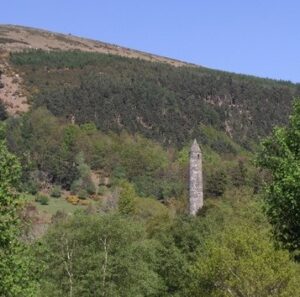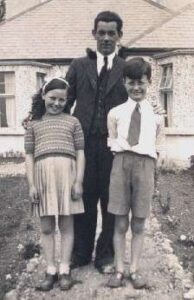How to locate the townland of origin of an ancestor
Part 1: Overview

Locating your ancestor’s townland of origin in Ireland is key to unlocking their family history, so if this step has already been accomplished you can move onto Steps in Your Research.
Not knowing the location of their ancestral home – which accounts for many descendants of emigrants – often presents them with the biggest challenge when trying to trace their heritage.
Many would-be family historians never even get started their research due to lack of a single key clue and don’t know where they should look for it.
Good news is there are techniques and sources available to you that can assist in pinpointing where your ancestor came from.
Unfortunately, it’s impossible to know in advance which source will provide that vital piece of information! Your search may reveal it right away or take several rounds before it finally surfaces – or both may happen simultaneously!
Focus your research on pinpointing an exact address or at least the county in which they lived.
If you already know the county but not its townland of origin, most of the advice below still applies; additionally, take note of Part II at the bottom of this page for more specific advice.
Where Should You Begin Your Research? Where you begin your Irish family history research depends upon what knowledge you already possess about it. Before venturing further, answer a few key questions before continuing.
Have you completed all the research stages and resources outlined on the Irish Roots and Next Steps pages? Have you interviewed any senior members of your family, gone through old letters, newspaper clippings or mementos to examine?
If that is the case for you, take action now. There’s no point going from archive to archive or database to database in search of information when that very same information could be sitting right under Grand Aunt Ellen’s roof!
Search Your Ancestor’s Adopted Country

If your initial steps have failed to locate their place of origin in Ireland, focus your search efforts on records from their adopted country (see link below).
Your immigrant ancestors’ histories will likely contain all types of details about them; do not restrict your research solely to direct lines; perhaps one of their relatives left a record of where he or she lived in their homeland even though your direct ancestor may not.
Of course, if your multiple-times-great-grandfather left his ancestral home in the early 18th century and dispersed among several hundred descendants around today – don’t get lost in maths! Don’t allow maths to interfere!
It is entirely plausible that only one of his children kept meticulous records or passed along information regarding their Irish roots.
If you want the exact details that will help to unlock your Irish family tree, searching may prove fruitful.
Locating key pieces of your Irish ancestry should begin with death certificates and headstone inscriptions, immigration records and census returns as well as newspaper reports or local histories.
Additionally, consider exploring these sources in any order that seems relevant for your family:
Civil Registration records: births, deaths and marriages
Financial and tax records held by banks, employers and insurers, accountant’s notes and tax returns pertaining to banks/employers/insurers as well as accountant’s notes for accountant’s notes as well as tax returns is maintained throughout life and after death documentations such as hospital admission details/coroner reports/death certificates/undertaker’s records/gravestones may also exist for each individual.
Property and Land Records include deeds; repair or conservation grants, military draft cards, service records and pensions for military members as well as passenger lists and naturalisation declarations from immigration records. Newspaper announcements about births, deaths, marriage anniversaries; obituaries as well as news reports are also records of this nature.
Occupational Records: Apprenticeships; professional qualifications; trade directories
Probate and Administration: executor’s comments; wills. For British-based research, I recommend SearchMyPast UK as your go-to site; otherwise Ancestry or MyHeritage are likely better options; these sites all require subscription.
FamilySearch.org is the sole major free database and global leader. It contains many of the records listed above; some can be accessed directly from home computers while others require visiting an LDS FamilyHistoryCenter to fully gain access.
When to Start Looking at Irish Records
Most genealogy books and websites recommend waiting until you know your ancestor’s townland of origin before exploring Irish family history records. While I generally agree, but cannot absolutely state that your time would be wasted in doing so.
Why is that? Simply because if I hadn’t known where my paternal ancestors had lived, finding their county would have been extremely straightforward using two major resources – the Irish civil registration index and Griffith’s Valuation – both now freely accessible online (links below).
As I search my family tree, my surname Santry is fortunate for genealogical purposes. According to Griffith’s Valuation in Ireland in 1850s, 24 householders with this surname could have been found. Of them all but one could be found in West Cork county; my search would have ended there!
Searching the Irish Civil Registration collection would have shown me immediately where to look; Cork would have been my starting point; Clonakilty seemed like its stronghold as well; at least 80% of Santry births recorded from 1864-1900 had their registration recorded here.
So in just a few clicks I would have known with complete confidence that my family originated in South West Cork; and their townland of origin likely would have been fairly easy to discover.
Now comes a big asterisk.

If I were searching for my mother’s family names – Tierney and Doyle – neither of these genealogical resources would have been of any assistance to me. An index of Griffiths could have provided some assistance by showing which counties most frequently associated with Tierney and Doyle households: Tipperary and Wexford respectively (both where both “my” families come from); but that wouldn’t tell the whole story as there were hundreds more Tierney and Doyle households outside those two counties as well.
Given all of the names returned during one search, it would have been virtually impossible for me to pinpoint my ancestor’s county or townland of origin.
Given that most Irish family historians will likely focus on common surnames like Doyle, Murphy, Kelly, Sullivan and Ryan rather than rare surnames like Santry, Hosty Lucid or Athy at an early stage of their research, Irish sources may not provide much assistance for most individuals at this stage of their journey.
No harm comes from having a look anyway – even just out of curiosity. Even if nothing else, these numbers will give an idea of the scope of your search for Irish ancestry; just don’t be discouraged by all their numbers!
